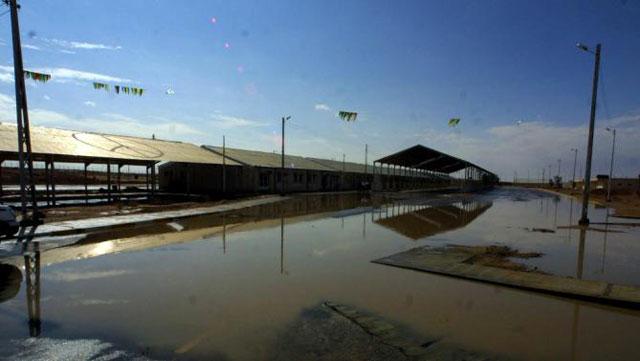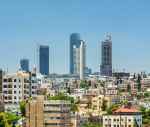You are here
Saudi Arabia boosts security on heavily fortified Iraq frontier
By Reuters - Jul 16,2014 - Last updated at Jul 16,2014
ARAR, Saudi Arabia — The group now calling itself the Islamic State rampaged across the border between Syria and Iraq a month ago and has since declared a caliphate across a swathe of the Middle East from Aleppo to the outskirts of Baghdad.
But if its leader Abu Bakr Al Baghdadi, who has proclaimed himself ruler of all the world’s Muslims, has his eyes on extending his caliphate south, he will face a far more formidable frontier at the border with Saudi Arabia.
Since the group then known as the Islamic State of Iraq and the Levant (ISIL) launched its lightning offensive last month in Iraq, Riyadh has sent thousands of troops to the border area.
They are beefing up a frontier already protected by a series of earth berms and fences, forming an exclusion zone stretching 10 kilometres deep into Saudi territory. Its entire 850km length is scanned by radar and infrared video cameras, monitored around-the-clock at a control room.
Last month King Abdullah pledged to take “all measures” to protect Saudi Arabia, both from Sunni ISIL, which Saudi Arabia has labelled a terrorist organisation, and also from Shiite militia in Iraq who have mobilised to fight the insurgents.
At least 1,000 army soldiers, 1,000 national guardsmen and three helicopter units have arrived to reinforce the border area near the town of Arar since ISIL’s advance in June, General Faleh Al Subai’i, commander of Saudi border guards in the area, told visiting reporters this week.
Saudi officials have not made public the total number of extra troops they have sent to the frontier, so far declining to comment on the accuracy of a report by Saudi-owned Al Arabiya television which put the number of reinforcements at 30,000.
Although alarmed by ISIL’s advance, border officials describe the Shiite militia — allied to the government in Baghdad and to Saudi Arabia’s enemy Iran — as the bigger threat.
“ISIL is not important. It’s a basic terrorist group without any military capability or suchlike. The most important one is the Shiite militia, which is organised with planning behind it,” Subai’i said.
Such views infuriate Baghdad, which accuses Riyadh of doing too little to stop ISIL fighters who pride themselves in killing Shiite civilians.
Riyadh strongly denies it has helped ISIL, and its state media and clerics preach against the group, but it has openly supported other Sunni militant groups fighting in Syria, and hundreds of Saudi nationals are believed to have joined ISIL.
Hard to breach
Unlike the heavily trafficked Syria-Iraqi border, which includes some of the most important commercial routes in the Middle East, the Saudi-Iraqi frontier is no hub for international trade. The post near Arar was last opened in October, when 65,000 Iraqi pilgrims crossed for the Hajj.
With the crossing closed, weeds grow high in the middle of the road to Iraq and a customs shed is carpeted in dust.
The fences and berms are hard to breach. No more than 12 people have been caught trying to cross the border illegally since the defences were build two years ago, officials said.
Since June, patrols have been increased. Border guards, in grey stone-pattern camouflage uniforms, say they have also noticed increased activity among their counterparts on the other side of the frontier.
Five guards, armed with assault rifles and stationed behind sandbags, gazed across a few hundred metres of desert to a small Iraqi frontier post on the other side of a dry wadi where a tiny-armed figure slowly paced the road.
Three rockets were fired from Iraq at a Saudi border guards’ housing complex last week. Subai’i said he did not know who had fired them but believed they were intended to provoke a violent response. His men were under strict orders not to shoot back.
“Some people suggest we look for who did it and retaliate. But the government said no; we will have higher vigilance and more police but nothing else,” he said.
A small crater in the stony ground shows where a rocket landed after flying over the Judaidat Arar housing compound, missing a small power plant and its fuel tanks by 100 metres before its shrapnel ripped ragged holes in the perimeter fence.
Iraqi border guards informed Saudi officers that they had discovered three deserted vehicles from which three Grad rockets had been fired and which held another five of the same type, Subai’i said.
No group has yet claimed responsibility for the rocket fire. In November, a Shiite militia quickly said it was behind the launching of six Grad rockets — the same kind used last week — into Saudi territory near the border with Kuwait.
The nearest Iraqi town in this expanse of desert is Al Nukhayb, 80 kilometres away. It is still in government hands, but to its northwest is territory where ISIL holds sway, and to its east is Najaf province, home to strong Shiite militias.
“We’re not sure who was responsible. It could be ISIL or the [Shiite] militia, or another group,” said Captain Sultan Al Mutairi of the border guards’ intelligence wing. “In Iraq there are many terrorist groups. It’s a mess up there.”
Related Articles
Three Saudi guards including a top commander were killed on Monday in a rare attack and suicide bombing by "terrorists" on the kingdom's border with Iraq, the interior ministry said.
Saudi border guards have been given orders to shoot infiltrators on sight after three troopers were killed on the Iraqi frontier earlier this month, a spokesman said on Monday.
Iraq is struggling to tighten control of its border with Syria, alarmed by a resurgent Al Qaeda force that seeks to build an Islamic state across a frontier drawn in colonial times.

















